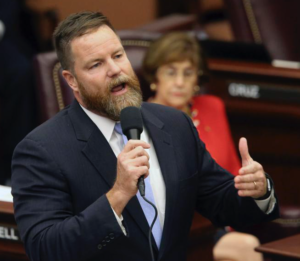By John Haughey
The Center Square
March 26, 2021
Florida’s proposed Fiscal Year 2022 (FY22) health care budget, the state’s single-largest categorical expenditure, will top $42.3 billion next year, a key budget-writing senator indicated this week.

Senate Health & Human Services Appropriations Subcommittee Chair Aaron Bean, R-Fernandina Beach, told the panel Wednesday he projects a $3.1 billion increase over this year’s $30 billion Medicaid budget driven by a pandemic-induced spike in enrollment.
He said the state’s Agency for Health Care Administration (AHCA) estimates 730,000 Floridians have joined the Medicaid rolls since the COVID-19 pandemic emerged last March, raising the number of enrollees to more than 4.5 million.
Bean said the state would pay $1.3 billion to secure $3.4 billion in matching federal Medicaid dollars to cover the additional 730,000 enrollees. Overall, he said, the state’s share of the projected $42.3 billion health care budget is $11.7 billion.
The $1.3 billion “is the sheer number of growth in our budget,” he said. “(The) $3.4 billion to cover all those Floridians that are depending on Medicaid. We fund it” with the state’s $1.3 billion match.
Florida’s Medicaid budget, although mostly funded through federal monies, was $28.3 billion three years ago and $30.1 billion this year before the pandemic swiftly, dramatically spurred enrollment, sometimes by 2,000 people a day, increasing state’s costs by 19 percent to $31.6 billion and potentially presenting lawmakers with a $1.25 billion shortfall, according to projections by state economists in December.
As presented by Bean, the state’s Medicaid budget would consume between $35 to $36 billion of his proposed $42.3 billion health care spending plan.
Of course, federal emergency assistance has blunted the impacts of increased Medicaid enrollment through the CARES Act last March, the ‘American Rescue’ plan recently adopted by Congress and a temporary increase in the Federal Medicaid Assistance Percentage (FMAP).
The 6.2-percent FMAP increase saved Florida’s general fund about $464 million this budget year, Senate’s Health & Human Services Appropriations Subcommittee legislative staff director Tonya Kidd said in January.
Bean said the FMAP increase and the relief packages “helps tremendously, but we are facing unprecedented items with costs that are going up. We are going to make reductions, but had we not had this, the reductions we were going to make would be much more aggressive. This is going to allow us to go forward in a much less sharp way.”
Bean’s “live within your means budget” would not affect funding for nursing homes but would cut the Medicaid hospital rate by 7.5 percent, which could cost state hospitals about $250 million in federal funding.
“If you are in the hospital business, it has been a challenging year, and under this proposed budget, it’s going to stay challenged,” Bean said. “We had to make some tough choices.”
The Florida Hospital Association (FHA) quickly criticized Bean’s plan.
“As Florida recovers from the COVID-19 pandemic, now is not the time to cut critical state funding to a vital safety net program and to the hundreds of thousands of doctors, nurses, and hospital staff who provide care to Medicaid patients,” said FHA President/CEO Mary Mayhew in a statement. “Our health care heroes risked their lives, and that of their families, to protect and care for us – they need our support now more than ever.”
The updated numbers Bean presented Wednesday are similar to those forecast in Medicaid Caseload Summary and Medicaid Caseload Forecast Comparison produced in December by state economists in the Social Services Estimating Conference (SEC).
The analysis projects that, beginning in FY23, the state’s Medicaid enrollment will decline by 2.3 percent, 1.9 percent, 1.8 percent and 1.8 percent in succeeding years to stand at about 4.243 million in 2026 – shedding nearly 350,000 from the projected 4.588 million FY 22 peak.

